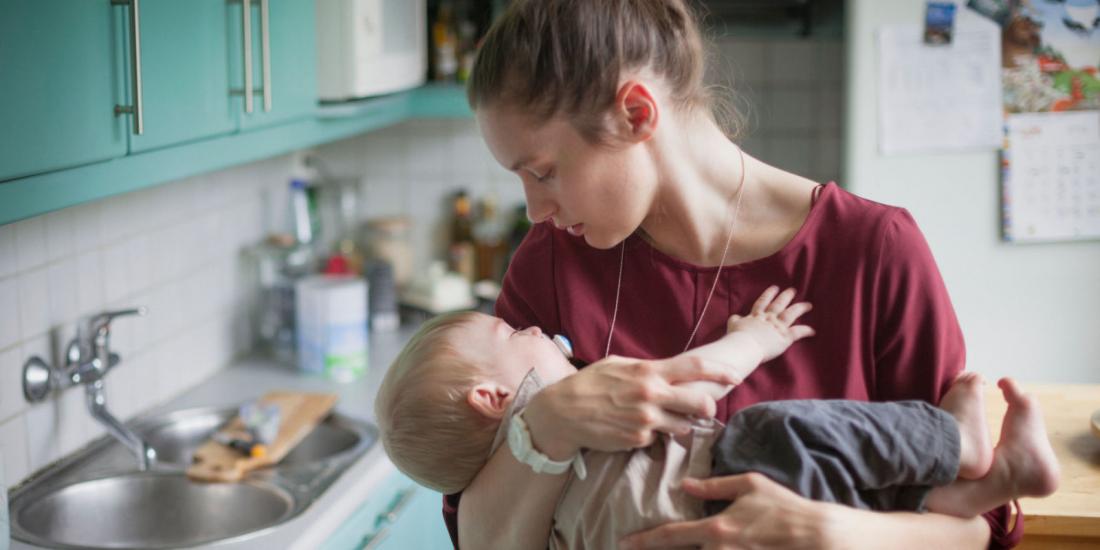DSI Presidential Fellows Caitlin Dreisbach and Caroline Kelsey are studying the interplay between the intestinal microbiome, anxiety and depression during pregnancy, and subsequent maternal-child attachment.
In an assessment of maternal and child microbiome samples, Dreisbach and Kelsey are investigating the longitudinal effects of microbial communities on infant socio-neurological development including attachment and emotional response. The Mothers, Infants, Microbiome, and Mental Health Presidential Fellows project also includes an expansion of an ongoing biobank at the University of Virginia Health System.
"Future innovation in science and healthcare will critically rely on those who are able to succinctly and expertly analyze large amounts of data to solve multifactorial research questions," Dreisbach said. "As a registered nurse, I intimately work with mothers and children and can see the direct linkages between theoretical thinking, bench science, and the real-world application."
This research project is exploring a new frontier combining data science and healthcare, and seeking to understand the complexities of infant development and the transition of maternal mental health through pregnancy and postpartum.
The interdisciplinary approach of the project will generate a first-of-its-kind data set allowing for a comprehensive and novel analysis of factors impacting maternal and child mental health. It brings together researchers from the UVA Babylab at the Department of Psychology and the School of Nursing to examine how the intestinal microbiome predicts levels of maternal internalizing symptoms and threat bias in mothers and their infants.
"This partnership between myself, a developmental psychologist, and Caitlin, a Ph.D. candidate in nursing earning her Master's of Science in Data Science, is vital to addressing the important questions of how the brain and body interact, and yet, due to university infrastructure this pairing tends to be very rare," Kelsey said. "The opportunity provided by the Presidential Fellows project through the Data Science Institute allows us to cross those barriers to collaboration and work on new and compelling interdisciplinary research."
Dreisbach and Kelsey have three goals for the project:
-
Identify maternal bacterium which are predictive of maternal internalizing symptoms. The pair hypothesize there will be an increase in certain bacteria (e.g., Lactobacilis) and decrease in other bacteria for mothers classified as depressed or anxious (Luna & Foster, 2015).
-
Using the identified bacterium strains, they will examine how the composition of these specific maternal bacterium are associated with maternal threat bias. Given that high levels of trait anxiety are linked to a threat bias in facial emotion processing (quicker orientation/heightened attention to angry and fearful facial expressions), they hypothesize that the bacteria strains which occur at a higher frequency in more anxious mothers will also be associated with higher threat bias (Cisler & Koster, 2010). Aim 3:
-
Using the identified bacterium strains, Dreisbach and Kelsey will examine how the composition of these specific strains of bacterium from the infants’ sample are associated with infants’ behavioral and brain responses to threatening faces. THe researchers hypothesize that maternal and infant threat biases are highly correlated. More specifically, they plan to test whether strains of bacterium which predict maternal threat bias will also be highly associated with infant behavioral and brain responses to threat (Pearson, Lightman, Evans, 2011).
“At this point, we have finalized study design and obtained all of the necessary human subjects, data security, Environmental Health and Safety, and HIPAA approvals through the Health Sciences Research Institutional Review Board,” Dreisbach said. “We hope to begin data collection in January.”
References
Cisler, J. M., & Koster, E. H. W. (2010). Mechanisms of Attentional Biases towards Threat in the Anxiety Disorders: An Integrative Review. Clinical Psychology Review, 30(2), 203. doi: 10.1016/j.cpr.2009.11.003
Foster, RA and JA Foster (2015). Gut brain axis: diet microbiota interactions and implications for modulation of anxiety and depression. Current Opinion in Biotechnology, 32, 35-41.
Pearson, R., Lightman, S. & Evans, J. (2011). Attentional processing of infant emotion during late pregnancy and mother-infant relations after birth. Arch Womens Ment Health, 14(1), 23-31.
May 2018: This project was awarded a $25,000 Dannon Gut Microbiome, Yogurt and Probiotics Fellowship Grant.
To stay up-to-date on this, and other research happening at the Data Science Institute, sign up for our newsletter.
